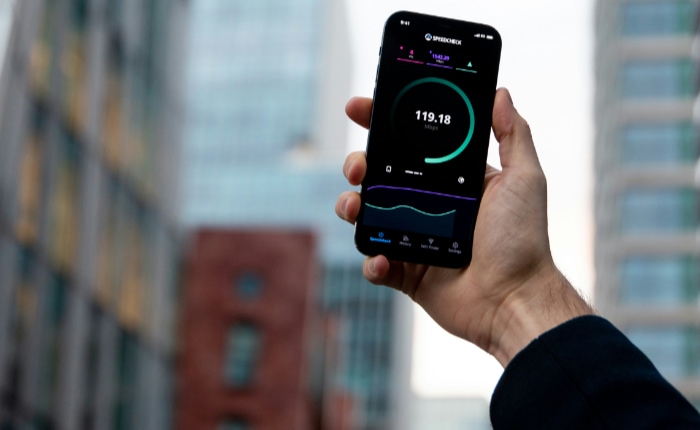How Internet Speeds Affect Your Online Experience

Fast, reliable internet is a staple of modern life, shaping everything from how we work and learn to the way we unwind and connect with others. Yet, many of us may not give much thought to what internet speeds really mean until a streaming movie buffers at the climax or a video call freezes during an important meeting.
Understanding Internet Speed
Internet speed is crucial for a smooth online experience, affecting everything from how quickly web pages load to the quality of video streaming. But what exactly is internet speed, and how do you measure it?
What is Internet Speed?
Internet speed refers to how fast data is transmitted from the web to your device and vice versa. It's measured in megabits per second (Mbps) or, for ultra-fast connections, gigabits per second (Gbps).
A higher number means more data can be moved in less time, leading to faster downloads, smoother streaming, and more responsive online gaming.
Download vs. Upload Speed
- Download Speed: This is how quickly you can pull data from the internet to your device. It's crucial for streaming videos, loading web pages, and downloading files.
- Upload Speed: This measures how fast you can send data from your device to the internet. It's essential for video calls, online gaming, and uploading files to the cloud or social media.
Understanding the difference between these two speeds is vital because most internet service providers (ISPs) prioritize download speeds. This setup generally matches typical internet usage patterns but can be a limiting factor for those who frequently upload large files or stream their own content.
How Speed is Measured
Internet speeds are measured using Mbps or Gbps. This measurement indicates the amount of data that can be transmitted each second.
To put it into perspective, streaming a high-definition video typically requires about 5 Mbps, while ultra-high-definition content might need 25 Mbps or more.
Factors Affecting Your Speed
Several factors can influence the actual internet speed you experience:
- Type of Connection: Fiber optic, DSL, cable, and satellite internet have varying speed capabilities.
- Network Congestion: More users online simultaneously can slow down speeds.
- Distance: The further the data has to travel, the longer it can take.
- Hardware: Older routers or devices may not support higher speeds.
The Significance of Different Speed Ranges
Internet speed ranges play a pivotal role in determining the quality and type of online activities you can comfortably engage in. From basic browsing to high-definition streaming, each activity has its own speed requirements.
Basic Browsing and Email
For light activities such as web browsing, sending emails, and social media scrolling, speeds of 1-5 Mbps are usually sufficient. These tasks require minimal data, allowing them to function smoothly even on slower connections.
At this speed range, you can expect reliable performance for these basic tasks without significant delays.
Streaming Video and Music
- Standard Definition Video: Speeds of 3-4 Mbps allow for streaming standard definition video without buffering.
- High Definition Video: For a seamless high-definition (HD) video streaming experience, speeds of 5-10 Mbps are recommended. This range supports clearer, more detailed images and a smoother viewing experience.
- Ultra High Definition and 4K: Streaming ultra-high-definition (UHD) or 4K content requires much faster speeds, typically around 25 Mbps or higher. This ensures the highest video quality, with minimal to no buffering.
Music streaming, even though it consumes less data than video, benefits from speeds within the 2-5 Mbps range, ensuring uninterrupted playback and quick song downloads.
Online Gaming
Online gaming requires speeds of 3-6 Mbps for a smooth experience, but that's just the beginning. For competitive gaming and to ensure minimal latency or lag, speeds of 10 Mbps or higher are preferred.
Additionally, upload speeds are just as crucial for online gaming, especially for those who engage in live streaming their gameplay, where 5 Mbps or higher can improve performance.
Video Calls
- Standard Quality Calls: For standard quality video calls, speeds of 1-2 Mbps are typically adequate.
- HD Video Calls: High-definition video calls, such as those on Zoom or Skype, perform best with speeds of 3-5 Mbps. This ensures clear video and audio, making for a more engaging and productive meeting or chat.
Work From Home and Large File Downloads
Remote work and downloading large files demand higher speeds to be efficient. Speeds of 50 Mbps or more can significantly enhance productivity, supporting multiple devices and high-demand activities simultaneously without degradation in performance.
This range is crucial for downloading large files quickly, seamless multi-person video conferences, and efficient cloud-based collaboration.
How to Determine Your Internet Speed Needs

Choosing the right internet speed for your household or personal use is crucial for an optimal online experience. It involves understanding your online activities, the number of devices connected, and future needs.
Assess Your Online Activities
Begin by evaluating the types of online activities you engage in regularly. Whether it's streaming high-definition videos, playing online games, attending video conferences, or simply browsing the web, each activity has its own speed requirement.
For example, streaming 4K videos demands significantly higher speeds compared to browsing social media. List your activities to estimate the cumulative speed necessary for a smooth experience.
Consider the Number of Users and Devices
The more devices connected to your network, the higher the internet speed you'll need. Each device, from smartphones and tablets to smart home devices, consumes bandwidth.
Consider how many people in your household use the internet simultaneously and the total number of devices that require connection. A family of four, each with their own device streaming, gaming, or browsing, will need a faster speed compared to a single user with one device.
Plan for Peak Usage
Think about when the highest internet usage occurs in your home. Often, this is in the evenings when family members are streaming movies, gaming, or downloading large files. Your internet speed should be able to handle peak usage times without significant slowdowns.
This ensures that everyone can continue their online activities without interruption.
Future-Proof Your Internet Speed
With technology advancing and online content becoming more data-intensive, opting for a slightly higher speed than your current needs can be wise. This future-proofs your internet service, accommodating new devices, higher-quality content, and more sophisticated online applications without requiring frequent upgrades.
Test Your Current Internet Speed
Before deciding on a new plan, test your current internet speed using online speed test tools. These tests give you a clear picture of both your download and upload speeds.
Comparing these results with your assessed needs can guide whether you should upgrade your plan or if your current speed suffices.
Improving Your Internet Speed
Experiencing slow internet can be frustrating, especially when it interferes with your online activities. Fortunately, there are several strategies you can implement to enhance your internet speed.
Upgrade Your Internet Plan
If your current internet speed doesn't meet your needs, consider upgrading your plan. Internet service providers (ISPs) offer various speed tiers, so selecting a higher tier can provide the bandwidth necessary for your activities.
It's essential to compare different ISPs and plans in your area to find the best fit for your usage and budget.
Optimize Your Router Placement
The location of your Wi-Fi router significantly impacts your internet speed and signal strength. For optimal performance, place your router in a central location, away from walls, metal objects, and other electronic devices that can interfere with the signal.
Elevating the router can also help distribute the Wi-Fi signal more evenly throughout your home.
Use a Wired Connection
Wi-Fi is convenient, but a wired Ethernet connection typically offers faster and more reliable internet speeds. For devices that require the highest speed and stability, such as gaming consoles or PCs used for streaming, consider using an Ethernet cable to connect directly to your router.
Limit Bandwidth-Hungry Applications
Some applications and devices use more bandwidth than others, which can slow down your internet speed for other tasks. Streaming services, online games, and large downloads can significantly impact your available bandwidth.
Close unnecessary applications when not in use and manage device usage during peak times to ensure a smoother internet experience for everyone.
Update Your Equipment
Outdated or malfunctioning routers and modems can contribute to slow internet speeds. Regularly check for firmware updates for your router, as these can improve performance and security.
If your router or modem is several years old, consider replacing it with a newer model that supports the latest Wi-Fi standards (such as Wi-Fi 6) for improved speed and coverage.
Secure Your Network
Unauthorized users on your Wi-Fi network can consume bandwidth, slowing down your internet speed. Ensure your Wi-Fi network is secured with a strong password and WPA2 or WPA3 encryption.
Regularly updating your password can also help keep unauthorized users off your network.
Conclusion
Grasping internet speeds and their implications is essential for a frictionless online journey. Through understanding the basic terms, recognizing how various speeds support different online activities, evaluating personal or household internet needs, and implementing measures to boost connection efficiency, individuals can significantly enhance their digital experiences.
Making well-informed choices about internet service plans, optimizing network setups at home, and staying ahead with equipment updates and security measures are key steps toward ensuring smooth and enjoyable online interactions. This knowledge empowers users to fully leverage their internet services, ensuring that work, leisure, and communication online are as efficient and satisfying as possible.


